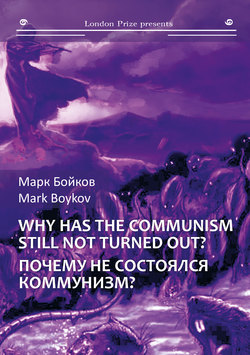Почему не состоялся коммунизм? (Кто виноват? Что делать? Куда идти?) / Why has the communism still not turned out? (Who is guilty? What should be done? Where to go?)

Реклама. ООО «ЛитРес», ИНН: 7719571260.
Оглавление
Марк Бойков. Почему не состоялся коммунизм? (Кто виноват? Что делать? Куда идти?) / Why has the communism still not turned out? (Who is guilty? What should be done? Where to go?)
Boykov Mark Vasliyevich
Бойков Марк Васильевич
Why has the Communism Still not Turned Out? (Who is guilty? What should be done? Where to go?) Political essay
Who is guilty?
What should be done?
Where to go?
Почему не состоялся коммунизм? (Кто виноват? Что делать? Куда идти?) Политический очерк (эссе)
Кто виноват?
Что делать?
Куда идти?
Отрывок из книги
Mark Boykov was born on September 12, 1938. During the war he was raised in the orphanage of the village Pistsovo of Komsomolsky district, Ivanovo region. Mark Boykov started his studies in Ivanovo in 1947. He was taken to the family of his father, who was a disabled war veteran of the first group in vision, and his wife, a nurse, and his stepmother. In 1950 entered the Gorky Suvorov military school, which he graduated from in 1958 in connection with his transfer to Moscow, and was sent to the Odessa higher combined arms command school, from which he was discharged in 1960 for health reasons.
Received his professional education at the faculty of philosophy of the Moscow State University. M. V. Lomonosov in 1961 –66, taking up and defending for the first time on the “Problem of partisanship in the conditions of socialism” on the Troika. Later worked as a teacher of philosophy at universities in Volgograd and Moscow.
.....
It seemed to be quite time for economists to reflect. However the scientists who serve the policy and the politicians sing chorus: “The wages shouldn’t grows faster than labor productivity”. Actually such scientists confuse labor productivity to simple mechanical performance and thus aspire to receive greater result due to relative reduction of wages. Reducing payment they intensify work, instead of raising its productivity. V. Lenin wrote: “We had seen how in 80-th (T: – of XIX century) our manufacturers have surpassed themselves in matter of ugly oppressions of workers as they have transformed penalties into means of downturn of wages, not having satisfied with downturn of quotations itself. (Lenin V. I., Complete works, v. 2, p. 59). That’s the way: Lenin’s ideological successors have gone on a way of cruel capitalists of XIX century. As a result actual depreciation of the work that quite often led workers to nervous failures and stresses has begun.
The quality of a product has been negatively influenced also. The time couldn’t be compressed. As if your rate of output or WQ has been increased, first, without technical improvement of the manufacturing, second, relying only on impellent acceleration so you can improve your skill only in the limits of labor intensification. And sooner or later the limit of human opportunities is reached, and the worker should or endow the interests, either search for another way out of situation. That’s why the more “accelerated” is the worker himself the more the worker’s sub-consciousness forces him to spend his energy less intensively. He leaves unfinished something in a product, worsens quality. The result is a decreasing of quality at the same time while the production output grows. Thus the worker compensates his loss, he met the increasing of work rates with diminishing of his labor efforts.
.....